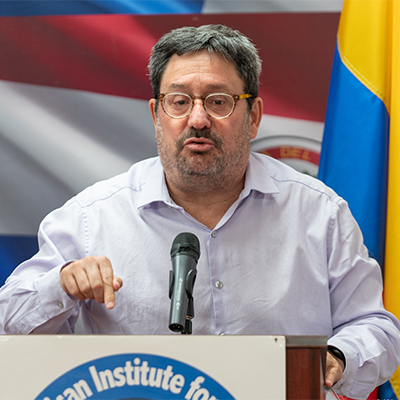The avatar president

By: Francisco Santos - 09/06/2025
Share:
Gustavo Petro has been missing for nearly a week and only communicates through social media. We don't know if it's him or one of his digital advisors writing this, but the truth is that no one is buying the story that he's missing because his life is in danger. Or maybe they are, but not because of external threats, but because of internal threats, to which Colombians have become accustomed.
I began asking more knowledgeable friends if a disappeared president, who only communicates through social media, is a virtual president. No, they told me almost in unison, because you can't discredit the virtual world that way. Of course, the virtual world has many negative components, such as social isolation, which leads to serious mental health problems, the loss of social skills, the depersonalization of education and work, the possibility of increased control and surveillance of the individual, and disconnection from the physical environment.
The virtual world's counterpart is fantastic. Global access to knowledge, flexible work and education, cost savings for individuals, digital inclusion, which especially benefits the poorest sectors of society, the global connections it facilitates that were previously impossible, and even the ability to be distracted 24/7. Those who said he wasn't a virtual president are right, because, all things considered, Petro doesn't apply the good things this world has to offer. If he were, instead of the horror and diplomatic embarrassment he plunged Colombia into by ditching Panamanian President José Raúl Mulino at the inauguration of the ACS (Association of Caribbean States), he would have called for a Zoom meeting and the matter would have been resolved. He didn't; he invited everyone to the event in Montería, Colombia, and then disappeared.
I thought he was a digital president back then, since he doesn't exist physically. Neither do the experts I asked. The digital world, of which virtuality is an element, also has its pros and cons, which, if we look closely, don't apply to the now-defunct Petro.
The digital world generates global access to knowledge, produces automation, and thus facilitates processes, which increases productivity, streamlines transactions and services, creates massive connectivity and instant communication; it is a key element in the development of innovation and collaboration in scientific matters, democratizes freedom of expression, and, with telemedicine, generates greater access to and quality of healthcare for citizens.
And the bad? Does it suddenly fit there? Perhaps it does, but on balance, the positive cannot be discredited either. In the digital world, power is concentrated, manipulation is facilitated, and reality can be replaced by deception. Petro, without a doubt. The digital world creates addiction—very Petro again—incentivizes the loss of privacy and mass surveillance, destroys jobs through automation, creates the scenario of fake news and algorithm manipulation, and is a source of crimes such as child pornography, hacking, scams, fraud, and cyberbullying. Finally, it dehumanizes interpersonal relationships by reducing empathy and isolating the individual. Petro and his actions fit this description, but not the other side of the coin. He is not a digital leader.
So what if he's missing, if he disappears and no one knows where he is? Some people answered, "He's an avatar." What the hell is that? I started investigating, and yes, that name or title fits. Colombia has an avatar as president, who has a first and last name: Gustavo Petro.
An avatar is the representation of a person in a virtual or digital environment. It can even be built with artificial intelligence to act, speak, and think like the character—a personalized deepfake. The avatar can have positive characteristics, but since it's a representation, it fits perfectly in Petro's case, as his personal characteristics are tremendously negative. The best part is that an avatar isn't innocent of what it does with it, because it represents it. Petro at n.
An avatar like Petro is used to falsify identity and deceive, and is used for scams and emotional and political manipulation. This avatar is disconnected from reality and lives more in its own metaverse than in the physical world; they call it digital escapism, which in Petro's case is ideological escapism, but equally disconnected. This avatar has no ethical responsibility, because, as it is playing a character, it acts without moral consequences. This avatar also has a malignant construction, designed for violence, crime, and the spread of hate and extremist ideologies. Yes, the perfect description.
Incredible, in the 21st century, Colombia has chosen an avatar of those who want to end the world, if not the one they want and need. I invite you to build your own version of that avatar so we can finally understand where it's going, which will undoubtedly not be anything good. Make it public; Colombia, and especially its young people, need to know, in their own world and in their own language, who is in power.
In the meantime, let's hope he returns from his metaverse to the real world—but only for a short time, as we already know he prefers living in that world, where he's king, where there are no controls or limits, and where he truly feels at home.
«The opinions published herein are the sole responsibility of its author».